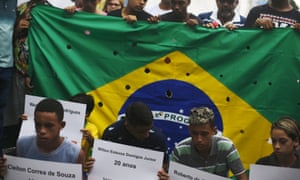Rio de Janeiro police officers arrested for killings of black and mixed-race youths
Four military police officers fatally shot five youths on Sunday and allegedly tampered with crime scene in latest incident in city’s long list of police killings
Four military police officers in Rio de Janeiro have been taken into custody following allegations that they killed five black and mixed-race youths from a favela and then doctored the crime scene to make it appear like self-defence.
The latest incident in a horrifyingly long list of killings by Rio’s police – which is far higher than that of any US city – has prompted outrage among favela residents and civil rights activists.
The five victims from the Morro da Lagartixa community – all aged 16 to 25 years old – were reportedly out celebrating a first paycheck on Sunday when the police peppered their car with bullets.
Family members said police gave no opportunity to surrender.
“What happened there was an execution,” said Jorge Penha, the father of one of the victims. “Everything I planned in my life has collapsed. They need to pay for what they did.”
Márcia Ferreira told local reporters that her son Wilton Domingos Jr was still alive when she arrived at the scene, but police refused to take him to a nearby hospital emergency unit and then threatened her and her daughter with a rifle when they tried to approach.
Locals claimed police tried to make the killing look like self-defence by placing a gun inside the car.
The five childhood friends were buried on Monday. Protesters held a demonstration the same day. Some carried a Brazilian flag riddled with 50 bullet holes – the same number fired at the car – and the name of the victims: Wilton Domingos Jr , Roberto Penha, Carlos de Souza, Cleiton de Souza and Wesley Rodrigues.
Investigators charged three officers with homicide – Thiago Resende Barbosa, Marcio Alves dos Santos and Antonio Filho. A fourth – Fabio da Silva – has been detained for fabricating evidence.
Their commander, Lt Col Marcos Netto, was also dismissed. It was the second recent controversy surrounding his unit following the shooting last month of two men on a motorbike by a police sergeant who mistook their hydraulic jack for a rifle.
Rio security authorities said the punishments were the result of stricter discipline to try to stem the violence.
But the city – like Brazil as a whole – has one of the worst records in the world for killings of and by police. Between January 2011 and October 2015, 2,510 people were killed in “self-defence” actions by the city’s police – an average of 1.4 deaths per day, according to the newspaper Extra.
Overwhelmingly the victims tend to be young, black males from poor communities in the north of the city such as Irajá.
Silvia Ramos, a social scientist and Coordinator of the Centre for Studies on Public Security and Citizenship, welcomed the punishments and admission of failure by senior officers as an improvement on the empty excuses made by the authorities in the past. But she said the police needed to address more fundamental problems of inequality and the different mentality of officers in conflict areas.
Unlike the pacification programs in favelas in the richer south zone of the city, she said police in the poorer northern zone feel they are in a war zone.
“In these conditions, police think that opening fire on a car is valid. They would not do this in the rich areas of the city. It’s a police model that coincides with a certain side of Rio,” she said. “It’s impossible to consider this as an individual problem of four police officers; the entire model of policing is to blame.”
Antônio Carlos Costa, the head of the Rio de Paz NGO, agreed that the police should be understood as well as punished.
“What happened is that they saw a car full of black people who fall into a category of those who are ‘’killable’ in our society,” he said. “The military police are not well prepared. They are not mature enough to deal with the situation in Rio, which is one of the most complex in the world. They lack supervision and are abandoned. They are victims and perpetrators at the same time.”



Nenhum comentário:
Postar um comentário